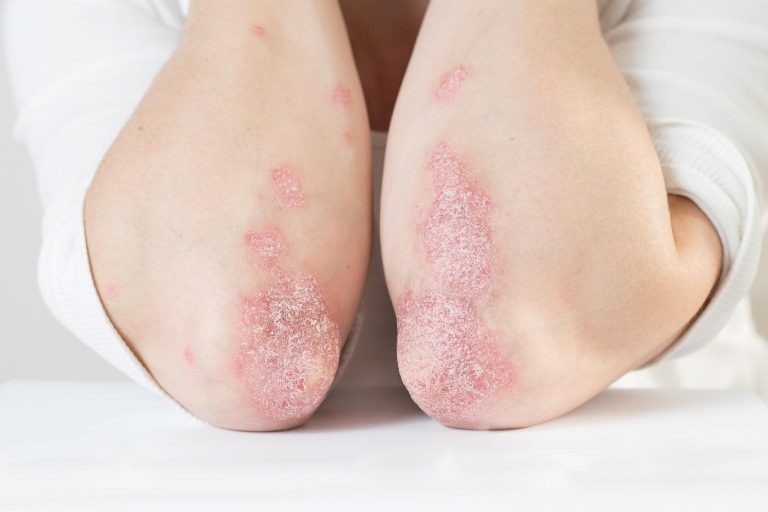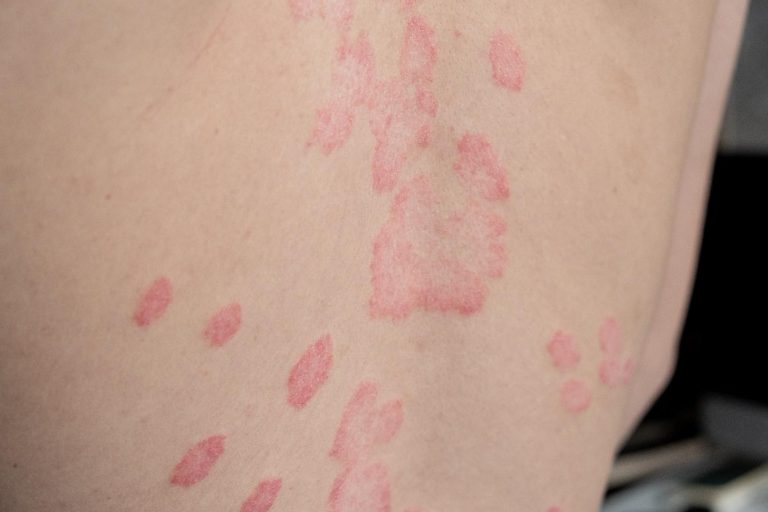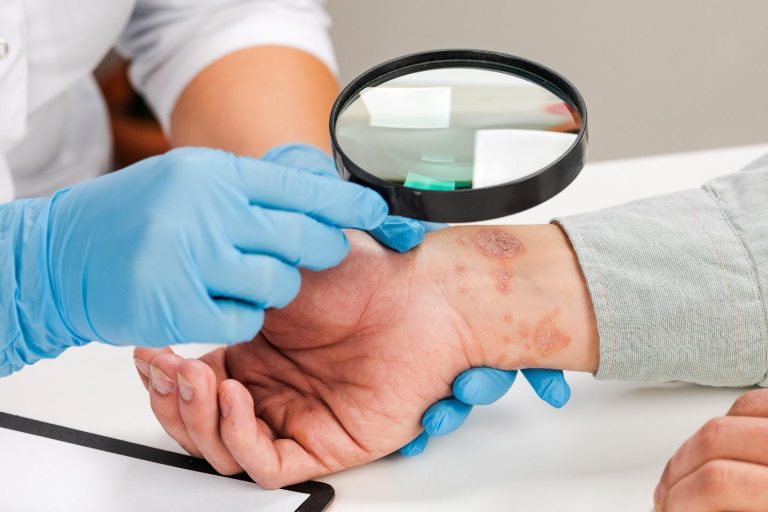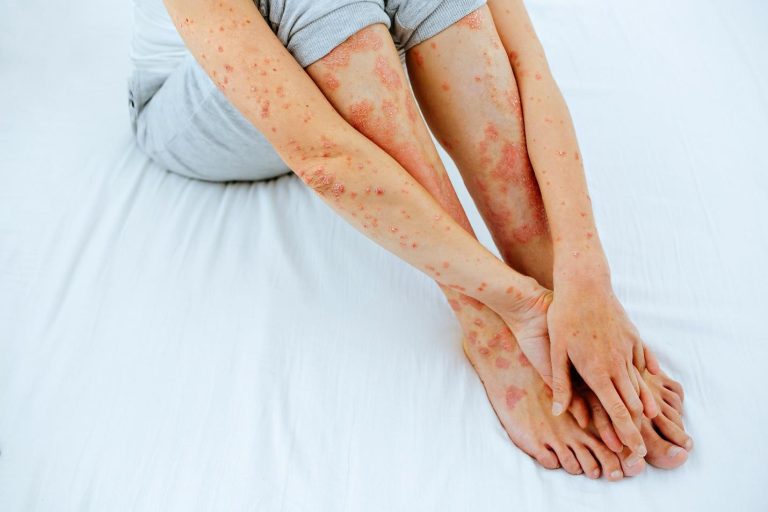

Psoriasis is a chronic skin condition that affects millions of people worldwide, including many in Singapore. While not as widely discussed as eczema, psoriasis is a common dermatological concern, with estimates suggesting that it affects around 1% of the population.
Psoriasis can develop at any age, but it typically first appears between the ages of 15 and 35. Though psoriasis is not contagious, it can significantly impact one’s quality of life, both physically, and emotionally.
Psoriasis is an autoimmune condition where the immune system mistakenly attacks healthy skin cells, triggering rapid cell turnover. This results in the buildup of dry, scaly plaques that cause redness, itching, and discomfort. The severity of psoriasis varies, with some individuals experiencing only minor irritation, while others face widespread flare-ups that affect their quality of life. In fact, the condition tends to follow a cycle, with periods of flare-ups followed by remissions.
There are several types of psoriasis, including:
Some of the common areas, where psoriasis often develop, include:

Psoriasis is usually a combination of genetics and triggers. It is caused by an overactive immune system that mistakenly accelerates skin cell production. Normally, skin cells take about a month to renew, but in psoriasis, this process happens within days. The excess cells pile up, forming the characteristic plaques and scales.
The exact triggers vary from person to person but can include:
One of the most recognisable signs is the formation of plaques, which appear raised, thickened patches of skin covered with silvery-white scales. Additionally, some of the common symptoms include:
Psoriasis, and eczema are both chronic skin conditions that cause redness, inflammation, and itching. But they have distinct differences in their appearance, causes, and triggers. Understanding these differences can help in identifying the condition and seeking appropriate treatment.
Characteristics | Psoriasis | Eczema |
Appearance | Characterised by thick, raised plaques with well-defined borders. The affected skin often has silvery-white scales that flake off. The plaques are usually inflamed, and the skin beneath may appear shiny, and red. | Typically appears as red, inflamed or weepy patches of skin with less distinct borders. The skin may look dry, cracked, or crusted, and in some cases, it oozes clear fluid, especially during flare-ups. |
Itchiness, and Sensation | Itching can vary but is generally milder compared to eczema. Some people report a burning or stinging sensation instead. | The hallmark of eczema is intense itching, which can become unbearable, especially at night. Persistent scratching can worsen inflammation and cause the skin to thicken – a process called lichenification. |
Triggers | Triggered by an overactive immune response, leading to rapid skin cell turnover. Common triggers include infections, stress, skin injuries, and certain medications. | Often triggered by external irritants and allergens, such as soaps, detergents, pollen, dust mites or pet dander. Weather changes and emotional stress can also worsen symptoms. |
Affected Areas | Commonly appears on the scalp, elbows, knees, and lower back. It can also affect nails, causing pitting, thickening, or crumbling. | Frequently found in the creases of the elbows, and knees, as well as on the hands, neck, and face. In infants, eczema often appears on the cheeks, and scalp. |
Underlying Cause | An autoimmune condition where the immune system mistakenly speeds up skin cell production, leading to plaque buildup. | Primarily linked to a weakened skin barrier, making the skin more sensitive to allergens, and irritants. It is often associated with other allergic conditions like asthma, and hay fever. |
As with any other skin condition, psoriasis is diagnosed through a combination of several diagnostic methods, such as:

There is no permanent cure for psoriasis. However, there are a variety of treatments available to effectively manage symptoms, reduce flare-ups, and improve quality of life. The best treatment plan depends on the severity of the condition, the type of psoriasis, and individual response to therapies. At Livingstone Dermatology, treatments can include:

Psoriasis is a chronic skin condition that stems from an overactive immune system, leading to inflammation, scaling, and discomfort. While it is not contagious, it can significantly impact one’s quality of life if left unmanaged.
It goes without saying that seeking medical advice early is key to managing psoriasis effectively. A dermatologist can provide a personalised treatment plan tailored to your condition, helping to control flare-ups, and improving skin health. Schedule a consultation with us today to take the first step towards healthier, and more comfortable skin.
Currently, there is no permanent cure for psoriasis. However, various treatments can effectively manage symptoms, and reduce flare-ups. With the right approach, including medications, lifestyle adjustments, and medical therapies, many people with psoriasis can achieve long-term remission, and maintain healthy skin.
No, psoriasis is not contagious. It is an autoimmune condition, meaning it results from an overactive immune system rather than an infection. You cannot catch psoriasis from another person through physical contact, sharing personal items or exposure to skin flakes.
Yes, scratching or injuring psoriasis plaques can break the skin barrier, making it vulnerable to bacterial infections. Signs of an infection include increased redness, warmth, swelling, pus, and pain in the affected area. If you develop a fever or notice worsening symptoms, seek medical attention promptly.
Psoriasis is more than just a skin condition as it can be linked to other health concerns. Some common complications include:
While psoriasis cannot be entirely prevented, certain lifestyle habits can help reduce flare-ups, and minimise symptoms. These include:
Psoriasis can impact daily life, but with proper management, many individuals continue to live full, active, and fulfilling lives. Seeking treatment, finding emotional support, and making lifestyle adjustments can significantly improve comfort, and confidence. If psoriasis is affecting your well-being, our dermatologist can help tailor a treatment plan to suit your needs.
Yes, some people experience periods where their psoriasis symptoms disappear completely — this is known as remission. Remission can last for weeks, months or even years, depending on individual triggers, and treatment effectiveness. However, psoriasis is a chronic condition, and flare-ups may return at any time. As such, consistent management, and professional guidance are key to keeping symptoms under control.
Diet alone does not cause or cure psoriasis, but certain foods may influence inflammation levels in the body. Some individuals find that reducing processed foods, excessive sugar, and alcohol while incorporating anti-inflammatory foods like fruits, vegetables, and omega-3 fatty acids can help manage symptoms. However, dietary triggers vary from person to person, so it is best to observe how your body responds.
At Livingstone Dermatology, we understand the impact psoriasis can have on your daily life. Our experienced dermatologist is dedicated to providing expert care and support, helping you find relief and regain control over your skin health.
Whether you’re dealing with a specific skin concern or seeking to enhance your natural beauty, Livingstone Dermatology is here to guide you on your journey to healthy, radiant skin.
Schedule an appointment today and experience the Livingstone standard of care in a welcoming, professional environment.